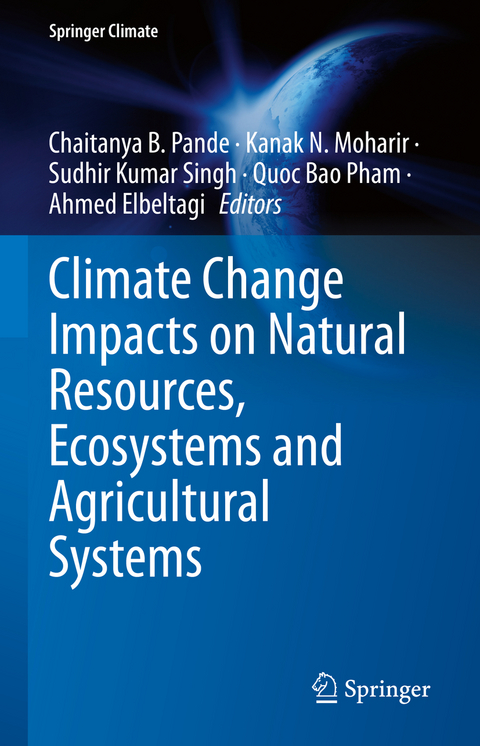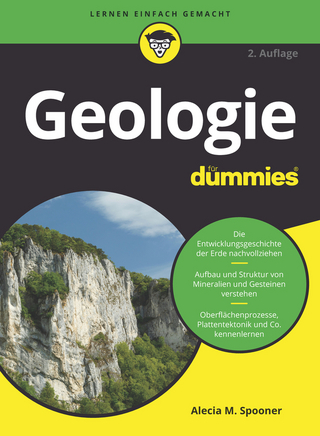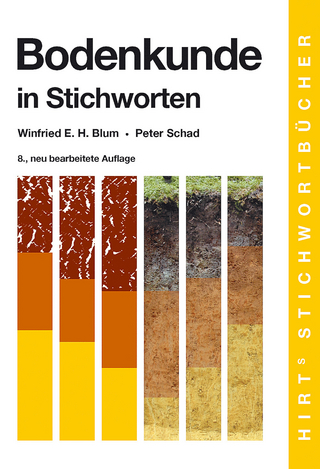
Climate Change Impacts on Natural Resources, Ecosystems and Agricultural Systems
Springer International Publishing (Verlag)
978-3-031-19058-2 (ISBN)
This book on the climate change, natural resources, landscape and agricultural ecosystems describes the contributing challenges related to natural resources, soil erosion, irrigation planning, water, landscape, sustainable crop yield agriculture and biomass estimation. Natural resources and agricultural ecosystems include factors from nearby regions where landscape and agriculture practices (direct or indirect) interface with the water, vegetation, irrigation planning and ecology. Changes in climatic situations impact all the natural resources, ecology, and landscape of agricultural systems, which affects productivity.
This book summarizes the various aspects of soil erosion, soil compaction, soil nutrients, aquifer and water with respect to vegetation, crops, pest and sustainable yields and management for the future. It also focuses on the use of precision techniques, remote sensing, GIS technologies, IOT and climate related technology for the sustainability of ecology, naturalresources and agricultural areas, along with the capacity and flexibility of natural resources and agricultural societies under climate change. This book presents both theoretical and applied aspects and will help as a guide for future research. The contents will appeal to researchers, scientists, and NGOs working in climate change, environmental sciences, agriculture engineering, remote sensing, natural resources management, remote sensing, GIS, hydrologist, soil sciences, agricultural microbiology, plant pathology and agronomy.Dr. Chaitanya B. Pande: (Dr. PDKV, Akola), Ph.D.(Sant Gadge Baba Amravati University, Amravati). I have more than one decade of research and industrial experience. I have reviewers of Earth Science Research Journal, American Journal of Geophysics, Geochemistry, and Geosystems, Sustainable Water Resource Management, Modelling Earth system and Environmental, Applied Geomatics, Journal of Agriculture Sciences (Bioinfo Publication), Applied Water Science, Journal of the Institution of Engineers (India): series A Springer, Groundwater Sustainable Development and Environmental Sustainable Development. Dr. Kanak B. Moharir Ph.D. Sant Gadge Baba Amravati University, Amravati is a Researcher, at Department of Geology, Dr. PDKV, Akola, India. With more than 5 years teaching and research experience, and published more than 36 research papers in various national and international journals and 15 research papers presented in national and international conferences with citations more than 265. My research interests include remote sensing, watershed management, hydrology, land use and land cover, aquifer mapping, groundwater modeling, hydrogeology, geomorphology and geology. I worked as reviewers of eight Springer journals and other journals. Dr. Sudhir Kumar Singh: (University of Allahabad), Ph.D. Offers basics of remote sensing & GIS, Remote Sensing and Satellite Meteorology courses to M. Tech. Students at K. Banerjee Centre of Atmospheric and Ocean Studies, University of Allahabad, Prayagraj, India. He has worked on the application of geochemical and hydrological model (SWAT) to study the impact of land use/land cover change on water quality and quantity of the drought-affected river basin. He has opted for a challenge to study Land use land cover studies in a; north-eastern part of Punjab using multi-date satellite data. He has also studied the impact of land-use and land-cover change on groundwater quality in the Lower Shiwalik hills: remote sensing and GIS-based approach. These studies also have socio-economic and environmental implications in achieving the objectives of sustainability. Worked as PI and Co-PI funded by University Grants Commission, Department of Science and Technology, New Delhi, India and Ministry of Earth Sciences, Government of India. He has published his results in peer-reviewed journals with high impact factors. Also, a part of the BRICS international team to look at the impact of land use/land cover and climate change on river basins. Research focuses on Remote sensing and geographical information system applications in the environment with special reference to land use/land cover change and water resource management. He has published more than 167 research papers in international journals with springer and Elsevier, Taylor and Francis with citations more than 3497. He has published two edited and one reference book. Worked as Associate Editor in Arabian Journal of Geoscience, Water Science Conservation and Engineering and Guest editor in many leading journals such as Physics, Chemistry and Earth, Remote Sensing and Water. Quoc Bao Pham Institute of Applied Technology, Thu Dau Mot University, Thu Dau Mot, Binh Duong, Vietnam; Email: phambaoquoc@tdmu.edu.vn Dr. Quoc Bao Pham got master and PhD degrees at Department of Hydraulic and Ocean Engineering, National Cheng Kung University, Taiwan. He has been reviewing for many journals such as Science of the Total Environment, Renewable & Sustainable Energy Reviews, Irrigation and Drainages, Ain Shams Engineering Journal, WATER, Stochastic Environmental Research and Risk Assessment, Geocarto International, Environmental Science and Research Pollution, Natural Hazards, Atmosphere (was also invited to be the Topic Editor), Applied Sciences, Arabian Journal of Geosciences, Alexandria Engineering Journal, Remote Sensing Applications: Society and Environment, Journal of Environmental Quality, Frontiers in Water, Acta Geophysica, Journal of Engineering Science & Technology. He is currently serving as topic editor of Frontiers in Water (Special Issue: Transitional Areas, Interactions, Feedbacks, Cascading Effects and Management Challenges). He has published more than 60 ISI research papers in international journals with Springer, Taylor and Francis, MDPI, IEEE, Nature, Wiley, and Elsevier publications with citations more than 378. His research interest includes remote sensing, GIS, drought analysis, climate change, watershed management, hydrological modeling, water quality. Ahmed Elbeltagi Ahmed Elbeltagi is a researcher at Agricultural Engineering Dept., Faculty of Agriculture, Mansoura University, Egypt. He obtained his M. Degree in Agricultural Engineering about using remote sensing for predicting moisture and nitrogen status for crops and Ph.D. in applications of remote sensing, GIS, and artificial intelligence methods for water management, scheduling, and future planning, from Zhejiang University, Hangzhou, China, respectively. He is currently serving as a guest Editor for Special Issue on Water Pollution and Treatment from American Journal of Agricultural and Biological Sciences. Simultaneously, He is currently serving as Editorial Board member in Journal of Agricultural Studies, American Journal of Agricultural and Biological Sciences, Agricultural Water Management, Computers and Electronic in Agriculture, Advances in Water Resources, Journal of Hydrology, and Water Resources Management. He has published many research papers in various national and international journals in the area of water footprint, water management, hydrologic modeling – machine learning, deep learning and GIS and RS techniques.
Chapter 1. Impact of Climate Change on Livelihood Security and Biodiversity - Issues and Mitigation Strategies.- Chapter 2. Desertification Intensity Assessment within the Ukraine Ecosystems Under the Conditions of Climate Change on the basis of Remote Sensing Data.- Chapter 3. Climate Change effect on the urbanization: Intensified Rainfall and Flood Susceptibility in Sri Lanka. Chapter 4. Climate Change a strong threat to food security in India: With Special Reference to Gujarat.- Chapter 5. Livelihood vulnerability assessment and drought events in South Africa.- Chapter 6. Possible influence of urbanisation on rainfall in recent past.- Chapter 7. Influence of Climate Change on Crop Yield and Sustainable Agriculture.- Chapter 8. Hybrid Daily Streamflow Forecasting Based on Variational Mode Decomposition Random Vector Functional Link Network Based Ensemble Forecasting.- Chapter 9. Climate change and natural hazards in the Senegal river basin: dynamics of hydrological extremes in the Faleme river basin.- Chapter 10. Review of various impacts of climate change in South Asia Region, specifically Pakistan.- Chapter 11. Future Hydroclimatic Variability Projections Using Combined Statistical Downscaling Approach and Rainfall-Runoff Model: case of Sebaou River Basin (Northern Algeria).- Chapter 12. Prediction of sugarcane yield in the semi-arid region based on the Sentinel-2 data using vegetation's indices and mathematical modelling.- Chapter 13. Effect of urbanism on Land Surface Temperature (LST) in a river basin and an urban agglomeration.- Chapter 14. Estimation of Land Surface Temperature and Urban Heat Island by using Google Earth Engine and remote sensing data.- Chapter 15. Study on irrigated and non-irrigated lands in Ukraine under climate change based on remote sensing data.- Chapter 16. Hybrid Kernel Extreme Learning Machine Based Empirical Wavelet Transform for Water Quality Prediction using Only River Flow as Predictor.- Chapter 17. Assessment ofClimate Change Impact on Land Use-Land cover using Geospatial Technology.- Chapter 18. Impacts of climate-induced events on the season-based agricultural cropping pattern and crop production in the Southwestern coastal region of Bangladesh.- Chapter 19. Towards Smart agriculture for climate change adaptation.- Chapter 20. Flood Impact and Damage Assessment based on the Sentitnel-1 SAR data using Google Earth Engine.- Chapter 21. Application of Hyperspectral remote sensing role in Precision Farming and Sustainable Agriculture under climate change: A Review.- Chapter 22. Tools and solutions for watershed management and planning under climate change.- Chapter 23. Isotopic proxy to identify climate change during the Anthropocene.- Chapter 24. Estimation of Land surface temperature for Rahuri taluka, Ahmednagar District (MS, India) using Remote Sensing data and Algorithm.- Chapter 25. Analytical Hierarchy Process (AHP) based on the spatial assessment of an endangered alpine medicinal herbAconitum heterophyllum in the Western Himalayan environment.- Chapter 26. Land use and cover variations and problems associated with coastal climate in a part of southern Tamil Nadu, India using Remote sensing and GIS approach.- Chapter 27. Classification of vegetation types in the mountainous terrain using random forest machine learning technique.- Chapter 28. Water conservation structure as an unconventional method for improving sustainable use of irrigation water for Soybean Crop under rainfed climate condition.- Chapter 29. Study of Image segmentation and classification methods for climate data analysis.
| Erscheinungsdatum | 24.02.2023 |
|---|---|
| Reihe/Serie | Springer Climate |
| Zusatzinfo | XV, 670 p. 1 illus. |
| Verlagsort | Cham |
| Sprache | englisch |
| Maße | 155 x 235 mm |
| Gewicht | 1313 g |
| Themenwelt | Naturwissenschaften ► Geowissenschaften ► Geologie |
| Naturwissenschaften ► Geowissenschaften ► Meteorologie / Klimatologie | |
| Wirtschaft ► Volkswirtschaftslehre | |
| Schlagworte | Agriculture system • climate change • natural resources • Remote Sensing • sustainable development |
| ISBN-10 | 3-031-19058-0 / 3031190580 |
| ISBN-13 | 978-3-031-19058-2 / 9783031190582 |
| Zustand | Neuware |
| Informationen gemäß Produktsicherheitsverordnung (GPSR) | |
| Haben Sie eine Frage zum Produkt? |
aus dem Bereich


